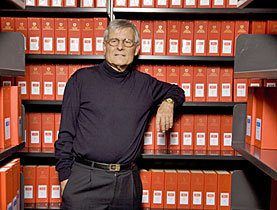
“Experts must be ready to fight for the law”

A Swiss expert on federalism tells swissinfo why the controversial naturalisation initiative, on which the country votes on June 1, is "discriminatory".
Thomas Fleiner, who founded the Federalism Institute at Fribourg University in 1984, is stepping down as director to start up a similar institution in Budapest.
But Fleiner, who will be 70 in July, says going for walks and gardening are not on the cards. “I’m not going to stop – teaching is my passion,” he told swissinfo.
Fleiner says he wants to write books and give lectures in Istanbul and Budapest.
“Founding the federalism institute is going well. The Hungarian government has shown great interest in it,” he said.
In Budapest Fleiner will focus solely on academic management – for the past 24 years he has had a double role as professor and businessman.
In Fribourg he advised foreign governments and groups, in addition to supervising 80 doctorate students, employing researchers from all over the world and contributing to countless Swiss laws.
Twenty years ago Fleiner was one of the few Swiss academics who regularly appeared in the media, although some of his colleagues weren’t so impressed, saying professors shouldn’t address the public.
“But one of the central duties of constitutional law is to inform the public!” Fleiner points out. “It’s a lot harder to make complicated issues intelligible than to speak in flowery academese.”
Discrimination
Fleiner cites the naturalisation initiative proposed by the rightwing Swiss People’s Party which aims to restore ballots on citizenship applications. A nationwide vote is due to take place on June 1.
“Here one should concretely and clearly explain the existential fears that arise if a community can reject an application for naturalisation randomly and without having to give a reason. That is discriminatory.”
He believes in this case the state should set boundaries and protect human dignity.
“It would be naïve to expect politicians to set themselves limits,” he said. “Hitler didn’t. National Socialism and apartheid in South Africa were two regimes that were more or less repeatedly legitimated by democratic decisions.”
For Fleiner it is a moot point whether the People’s Party initiative violates the law.
“I don’t think it should have been brought to a vote,” he said. “In [canton Appenzell Innerrhoden in 1990] the federal court had to step in because the men didn’t want to give women the vote.”
Serbian adviser
Fleiner also advised the Serbian authorities during the first talks over Kosovo, a role that caused quite a fuss.
“As a scientist, you also have to be prepared to fight for the law. Many legal experts give power a leg up. That’s not my remit,” he says when asked why he had accepted the mandate.
“The fact that the United States and the European Union accept Kosovo’s unilateral declaration of independence just like that is international law’s loss.”
International law, he said, requires consensus between both parties, which is why he advised the Serbian government to bring the issue of Kosovo’s independence before the International Court. If the Serbs win, negotiations on Kosovo’s future will have to start from scratch.
Trust
Fleiner’s fundamental criticism of the West is that it is trying, in the case of Kosovo, to export its own model.
“Ultimately we must revise our opinions, trust people and deal with both parties on the same level. That’s the only way a solution can be brought about. It also needs a lot of time – Israel is 60 years old and is yet to get there.”
This is also the basic philosophy of the Federalism Institute. “Here, researchers from abroad have the opportunity to find solutions for themselves. We can’t do it for them.”
So is the Swiss model of federalism exportable? “I’ve never thought so, but I do think that our federalism is unique and has triggered many light bulb moments,” he said.
“Switzerland is the only state in western Europe that has ruled not only under private law but also institutionally on the fact that we have various languages. Regulations for minorities have been introduced, proving that cultural diversity is taken seriously politically.”
swissinfo, based on a German article by Andreas Keiser
Fribourg University’s Federalism Institute, the only one its kind in Switzerland, is part of the law faculty.
The Swiss government is its biggest source of outside funding.
The institute’s International Research and Consulting Centre works with the Swiss Agency for Development and Cooperation, the Swiss foreign ministry, other Swiss and international authorities and bodies.
One of the centre’s main activities is its knowledge exchange, which includes consultancy, expertise and facilitation on questions of federalism, decentralisation, constitutional matters and institution-building.

In compliance with the JTI standards
More: SWI swissinfo.ch certified by the Journalism Trust Initiative





























You can find an overview of ongoing debates with our journalists here . Please join us!
If you want to start a conversation about a topic raised in this article or want to report factual errors, email us at english@swissinfo.ch.